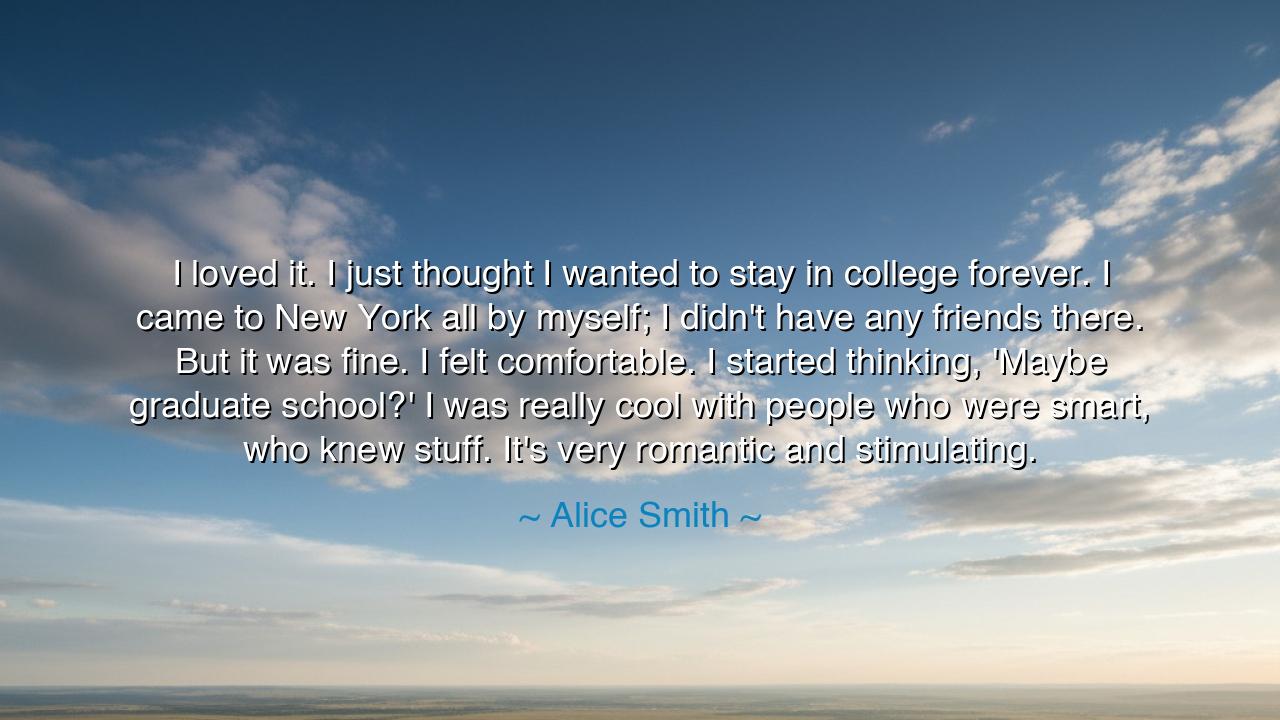
I loved it. I just thought I wanted to stay in college forever. I
I loved it. I just thought I wanted to stay in college forever. I came to New York all by myself; I didn't have any friends there. But it was fine. I felt comfortable. I started thinking, 'Maybe graduate school?' I was really cool with people who were smart, who knew stuff. It's very romantic and stimulating.






"I loved it. I just thought I wanted to stay in college forever. I came to New York all by myself; I didn't have any friends there. But it was fine. I felt comfortable. I started thinking, 'Maybe graduate school?' I was really cool with people who were smart, who knew stuff. It's very romantic and stimulating." These words, spoken by Alice Smith, reflect the deep romanticism and intellectual curiosity that often accompany moments of personal growth and independence. To leave behind the familiar, to step into the unknown, and to embrace a new life in a city like New York, speaks to the spirit of adventure and the pursuit of something greater. For Smith, the intellectual environment of the city, coupled with her personal comfort and sense of belonging, became a source of stimulation, a place where her mind could expand and her dreams could take root.
In the ancient world, the pursuit of knowledge and wisdom was considered a noble endeavor, and many of the great philosophers sought such an environment of intellectual stimulation and personal growth. The Academy of Plato, founded in ancient Athens, was a place where young minds gathered, free from the distractions of the outside world, to explore the vast realms of knowledge. It was a place where the pursuit of truth and wisdom was seen as the highest calling, a romantic journey of intellectual discovery that resonated with all who entered. Plato himself, deeply immersed in the world of ideas, might have found such a place as Smith describes: a space of intellectual freedom, where one's mind could wander, grow, and flourish in ways that could shape the very future of the individual.
Smith's reflection on her time in New York, and her sense of being comfortable despite being alone, draws parallels to the ancient tradition of self-discovery. The ancient philosophers often spoke of the importance of solitude as a means to find one's true path. Socrates, for instance, spent much of his life in solitary contemplation, seeking wisdom from within as much as from the world around him. For Smith, the act of coming to a bustling, challenging city like New York without knowing anyone could have been a daunting journey, yet it was this very solitude that allowed her to discover a sense of comfort and belonging within herself. It is this balance of independence and intellectual curiosity that makes such a path so romantic, not in the sense of fairytales, but in the heroic pursuit of one's own potential.
Consider the journey of Aristotle, who ventured from his home in Macedonia to study under Plato in Athens, and later to become the tutor to Alexander the Great. Like Smith, Aristotle sought intellectual stimulation and found romance in the world of ideas. His journey was one of both self-discovery and growth, driven by a desire to know and understand more about the world. Much like Smith's reflection on graduate school and intellectual community, Aristotle thrived in the presence of those who could challenge him and expand his understanding. The romanticism of intellectual discovery, the allure of learning, and the possibility of transforming oneself through knowledge were the very forces that propelled Aristotle toward greatness. In the same way, Smith is drawn to the intellectual atmosphere of New York, a place where the exchange of ideas can shape and expand the self.
The lesson that Smith’s experience offers is one of embracing growth and intellectual stimulation. In moments of transition, when we find ourselves in unfamiliar surroundings, we have an opportunity not only to discover new places but also to discover ourselves. It is easy to feel overwhelmed when faced with the unknown, but it is often in these moments that we are most open to learning and growing. Smith found joy not just in the challenges she faced, but in the intellectual stimulation that came from being around others who valued knowledge and thoughtfulness. Similarly, we too can find romance in the pursuit of self-discovery and growth—whether that comes through books, ideas, or experiences.
In your own life, seek out those moments of intellectual stimulation that make you feel alive, that push you to question and reflect on the world around you. Like Alice Smith, do not be afraid to step into the unknown, whether that means going to a new city, pursuing a new career, or engaging with people who challenge your thinking. Allow yourself to feel the romanticism of discovery—the excitement that comes from learning something new about the world and about yourself. Life’s greatest adventures often begin with a single step into unfamiliar terrain, whether that terrain is physical, emotional, or intellectual. Take that step, and embrace the journey.
Just as the ancient philosophers ventured into the unknown to uncover wisdom, so too can we find meaning in the pursuit of knowledge and personal growth. Life is not simply about arriving at a destination but about embracing the romantic path of discovery that leads us to a deeper understanding of who we are and what we can become. Let the spirit of intellectual curiosity guide you, and let it stimulate you toward new horizons of thought, experience, and self-realization. The romantic nature of learning lies not in the destination but in the passionate pursuit of wisdom and the growth that comes with it.






AAdministratorAdministrator
Welcome, honored guests. Please leave a comment, we will respond soon